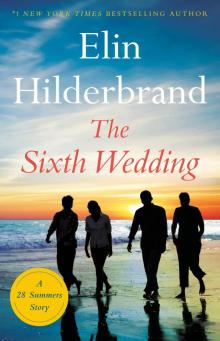- Home
- Elin Hilderbrand
What Happens in Paradise Page 12
What Happens in Paradise Read online
Page 12
Cash is nearly at the top step, prepping himself for an uncomfortable confrontation, when he hears a young voice say, “Winnie! Uncle Cash!”
It’s Floyd, bobbing in the pool. And Baker, sitting on the edge in just his bathing trunks.
“Hey,” Baker says.
“What—” Cash shakes his head. Winnie’s tail is going nuts; she barks. “What are you doing here?”
“We’re moving here!” Floyd announces. “To live!”
Huck
Agent Colette Vasco is a serious woman, though not unkind. She has a niece Maia’s age, her sister’s daughter, and they’re very close. Agent Vasco knows that being twelve isn’t easy, and she understands how difficult things must be for Maia right now with the sudden loss of her mother. She agrees to come get the money while Maia is at school.
“I’m sorry to say, I have to bring a search team, including a drug dog, but if all goes according to plan, Maia will never know we’ve been there.”
Huck is grateful. A team of four show up, along with a German shepherd named Comanche. Comanche does a quick, frenetic tour of the house, although he’s in and out of Huck’s room in a matter of seconds, which makes Huck wonder if maybe it does smell like rotting fish.
Comanche is tied up in the shade outside while the team comes in to retrieve the money from under Huck’s bed. Then they systematically search the rest of Huck’s house. Huck would be worried about them invading Maia’s room but it looks like it’s already been ransacked. There are clothes everywhere; supplies for Maia’s bath-bomb business are spread across her desk, and hair products and makeup cover the surface of the dresser. There’s also a fair amount of trash—wrappers from Clif Bars, half-full cans of LaCroix coconut seltzer.
“Maybe you could clean up while you’re in there,” Huck jokes. The FBI agents don’t so much as crack a smile. They aren’t humans, they’re robots, Huck thinks. Robots on a mission. Fine; Huck will leave them to it. He peers into Rosie’s room—Vasco herself is on her knees, pawing through the dresser drawers—then he goes into the kitchen, does a shot of Flor de Caña, and heads out to the deck, where he smokes three cigarettes in quick succession and keeps an eye on the southern waters for the Mississippi. Adam is taking the charter by himself today; Huck called and told him that something came up and he couldn’t get away.
Agent Vasco lets Huck know that they haven’t found anything else of interest. They are taking the cash, and Vasco asks for the numbers of Rosie’s savings and checking accounts.
“I realize how difficult it must have been to call us about that money,” Agent Vasco says. She lays a hand on Huck’s arm. Her nails are polished shell pink and she wears no wedding ring; Huck checks out of habit. Agent Vasco is an attractive woman, a redhead like Huck, and she has a salty-sweet aspect that reminds Huck of his ex-wife, Kimberly. And, for that matter, LeeAnn. Huck puts Agent Vasco at about thirty-five, still young enough to want children, which is too young for Huck. He’s encouraged that he’s even thinking this way; it’s taking his mind off Irene.
When he next talks to Irene, he’ll tell her how attractive Agent Vasco is. Maybe she’ll get jealous.
“That wasn’t money I earned and I doubt it was money Rosie earned,” Huck says. He hands over the statements from Rosie’s bank accounts. “If Rosie is guilty by association of something…well, it’s my job to make sure it doesn’t affect Maia in any way.”
“I understand,” Agent Vasco says. “I was really hoping I might find something of a more personal nature in Rosie’s room. Letters, or a diary.”
Diary, Huck thinks. Rosie kept a diary when she was younger. She used to threaten LeeAnn with it, saying that future generations would someday learn what a mean witch LeeAnn was, how harsh and unfair she was to her only child. Huck has no idea if Rosie kept up her diary-writing into her adult years. Because she worked nights at La Tapa, most of her downtime was during the day, when Huck was at work and Maia at school.
Letters? Well, there might be letters from Russell Steele if this were 1819 or even 1989, but nowadays people didn’t write letters; they wrote to each other on their phones.
“I’m sure Rosie had her phone with her.”
“Yes,” Agent Vasco says. “We’ve subpoenaed the records.”
Subpoenaed sounds serious, but of course, Rosie had a huge amount of cash stuffed into a drawer.
“If you don’t mind my asking, what kind of crimes are you investigating?” Huck is thinking drugs, obviously. It’s the Caribbean.
“I’m not at liberty to say. Also, we aren’t really sure what we’re dealing with here.” Agent Vasco offers Huck a tight smile. “If we have any further questions, I’ll be in touch.”
“That’s it?” Huck says. “You’re leaving me?”
“Yes,” Agent Vasco says. “You should be happy.” She gathers the goons and they follow her out to the car with two black duffel bags filled with the money.
Easy come, easy go, Huck thinks.
Agent Vasco and company drive down Jacob’s Ladder’s series of switchbacks; Huck spies the car once, twice, three times—then they disappear. At nearly the same moment, Huck sees the Mississippi gliding across Rendezvous Bay. Today’s charter was a couple of state troopers from Alaska. Apparently, these two are famous; they’re featured on some reality-TV show, which Huck has a difficult time fathoming. Huck has less than no interest in celebrities; what makes him regret missing today is that these gentlemen really wanted to fish. Huck nearly calls Adam to tell him to turn around and pick him up at the Westin dock, but that’s impractical, a waste of time and gas.
It’s only ten o’clock and Huck doesn’t have to get Maia until three. He could read his book—he still hasn’t finished the Connelly—and, he supposes, he could go to the beach. He hasn’t been in a long time; whenever Maia wanted to go, Rosie would take her. LeeAnn used to love sitting on Gibney, and Huck loved LeeAnn so he would join her there, though left to his own devices, he would go to Little Lameshur, far, far away from the crowded north shore. Should Huck pack up a fish sandwich and drive out to Little Lameshur? Maybe live really large and stop at the Tourist Trap for a lobster roll on the way? The idea is novel enough to be intriguing, but then Huck thinks about one of Agent Vasco’s comments: We aren’t really sure what we’re dealing with here.
Huck isn’t sure what they’re dealing with either, but he does know one thing: he was relieved when the dog didn’t go pawing at the floorboards and they didn’t discover blocks of cocaine or heroin to go along with all that money.
Someone on this island must know more than Huck does. The coconut telegraph is real. Huck picks up his phone and calls Rupert.
Because Rupert doesn’t like to leave Coral Bay, he and Huck meet at Skinny Legs. It turns out, it’s as good a place as any to have a quiet conversation in the middle of a gorgeous sunny day. Skinny Legs is the quintessential Caribbean bar. It’s tucked into a grove of shade trees a few hundred feet from the lip of Coral Bay. The bar itself looks like a lean-to built by Robinson Crusoe after a few rum punches. It’s open to the air on one side and features picnic tables thick with paint and a little stage for live music from happy hour until last call. There’s an adjacent gift shop that sells souvenirs celebrating all things Skinny Legs; Huck has never set foot in it. In Huck’s opinion, Skinny Legs’ only fault is that it’s gotten so famous. The best way to ruin a place is to make it popular.
One of the things that keeps Skinny Legs authentic is that characters like Rupert still hang out here. Rupert is the prince of the establishment, if you can call a sixty-something-year-old man a prince. He’s in his usual spot, corner stool on the right-hand side; he has a Bud Light in front of him. Huck checks the time: eleven fifteen. He still has more than three hours before he has to pick up Maia from school, and for this conversation, he probably needs something stronger than an iced tea. He flags down Heidi, the bartender.
“Painkiller, please,” Huck says.
Rupert chuckles. “That’s a woman’s drink.”
“I’m not allowed to say things like that in my house,” Huck says. “Don’t you know any better?” He takes a stool and rubs the top of Rupert’s bald brown head.
They fall into their usual pattern of conversation, which is distinguished by long pauses and subsequent non sequiturs. Rupert doesn’t like to be rushed; he’s retired now and has earned the right to mull things over, and if his mind wanders in the process, oh, well. Rupert has lived on St. John his entire life; his family goes back generations, and Huck teases him by saying that Rupert’s ancestors invented the concept of island time, but Rupert is the one who perfected it.
Huck drinks one painkiller and waves to Heidi for another before Rupert finishes summarizing his list of physical ailments: his back has been giving him trouble, his right toe throbs in the rain, he can’t sleep more than three hours without having to get up to take a piss. Then it’s Huck’s turn to talk about how the fish are running. Better since the new year, he says—meaning since Rosie died, meaning since Irene set foot on his boat and into his life.
“Good to hear it,” Rupert says. “And how’s Maia?”
Huck tells Rupert about taking Maia to town with her friends and how that bothers him.
Rupert laughs. “It’s a goddamned island, Huck. How much trouble can she get in? All the West Indian ladies who grew up with your wife have eyes in the backs of their heads. If Maia takes so much as a puff of a cigarette, you’ll hear the crowing all the way up on Jacob’s Ladder.”
Huck shakes his head. “They don’t smoke anymore, Rupert. They vape. It’s electronic, thing looks like a pen. They put a pod in it—”
“Don’t tell me,” Rupert says. “I don’t want to know.”
“It’s all happening so fast. And I don’t like the timing, her getting so independent right after her mother dies.” This is when Maia would be most vulnerable to vaping and drinking and—Huck can barely let himself think it—sex. He has to find a way to make sure she grows up responsibly. Honestly, he could use some help.
They’re quiet a few minutes. The song in the background is Warren Zevon’s “Lawyers, Guns, and Money.” Huck isn’t sure Rupert is listening to the music, but it feels like a natural segue. “So I had a visit this morning,” Huck says. “From the FBI.”
Huck can sense his friend’s invisible antennae rising.
“That’s why I called you, actually,” Huck says. “To see if you know something I don’t.”
“Funny you should ask,” Rupert says. “Because I heard federal officers paid a visit to the Welcome to Paradise Real Estate office.”
“Really?” Huck says. “Paulette Vickers—”
“Paulette and Doug Vickers and the little boy are gone,” Rupert says. “Rumor has it they left last night on the car barge.”
“Left as in …”
“Left as in left,” Rupert says.
Left as in left. Paulette and Douglas Vickers, who owned Welcome to Paradise Real Estate, pulled their young son, Windsor, out of school and packed what they needed into Doug’s pickup and left twelve hours before the FBI showed up. That was the story Rupert heard from Sadie, one of his many girlfriends, and Sadie’s gossip was generally known to be reliable.
On his way home, Huck drives past the office, and sure enough, there’s the black SUV parked out front, its presence as ominous as a hearse.
The question that bothers Huck is this: How did Paulette and Douglas Vickers know that the FBI were coming? Did they find out Huck had contacted Agent Vasco? Was Huck’s phone compromised? Was there a bug somewhere in his house? If so, would the FBI have found it this morning in their search? Huck lights a cigarette. He needs to get a grip. This is the stuff of movies and Connelly novels. This is not daily life in the Virgin Islands.
At three o’clock, he’s waiting out in front of the Gifft Hill School when Maia emerges with her cronies Joanie, Colton, and Bright.
Here we go again, Huck thinks.
Maia studies his expression. “You okay, Gramps? You in a bad mood again?”
He meant what he told Agent Vasco. He is determined to keep whatever Rosie was involved with away from Maia. She’s a twelve-year-old girl who wants to hang out with her friends. It’s a goddamned island. She’s safe here.
But really, he could use some help.
“I’m fine,” he says. He won’t smile because then Maia will know there’s something wrong, so he adopts the air of a weary chauffeur. “You guys can all hop in.”
Baker
He knows he shouldn’t be surprised that his brother came back down to St. John and, apparently, plans to make it his permanent home, sponging off Irene, but he is. He tells Cash as much, though instead of using the word sponging, he calls it “taking full advantage of Mom’s generosity.” It’s marginally kinder; after all, Floyd is listening.
“I’m not taking advantage any more than you are,” Cash says with what Baker can only assume is a phony smile. “And I found a job.”
“So soon?” Baker says. “Where?”
“First mate on Treasure Island,” Cash says.
First mate on Treasure Island? It takes Baker a second, but he puts it together. Treasure Island is the boat that Ayers works on.
“You have got to be”—he swallows the swearword because of Floyd—“kidding me.”
“Not kidding,” Cash says.
Not kidding; of course not kidding. Somehow Cash weaseled his way onto that boat and into near-daily interaction with Ayers.
“I didn’t realize you liked the water,” Baker says. “I thought you were more of a mountain guy.” He says this with relative equanimity. What he’s thinking is this: You hate water unless it’s frozen! You’re ten thousand feet out of your comfort zone! The only reason you’re here is to try and steal my girl! “How did you find out about the job, anyway?”
“Ayers texted me,” Cash says. He rubs Winnie under the chin. “Winnie and I just went for a hike and a swim with Ayers and Maia on the Johnny Horn Trail. It was beautiful, but man, was it hot. I was dreaming about this pool the whole way back.” Cash pries off his hiking boots and strips down to his swim trunks. Baker tries to look at his brother objectively. Cash is in good shape; he has six-pack abs and really strong legs from all the skiing, but he’s not quite six feet tall, so Baker has always discounted him as a possible rival. But now, Baker has all kinds of troubling thoughts. Maybe Ayers is into the short, stocky, and (admittedly) super-cut look as opposed to the tall, broad-shouldered, and (admittedly) dad-bod look. (Baker flexes his arm behind him to see if he still has triceps. Maybe; it’s hard to tell.) Cash went hiking and swimming with Ayers and Maia—he’s been the recipient of Ayers’s smile. It’s Baker’s fantasy.
He’s jealous.
His first instinct is to be a jerk about it. But honestly, he doesn’t want to do battle with Cash over Ayers. He doesn’t want to do battle with Cash over anything. He finds he’s actually psyched—and relieved—that Cash is here. Baker talked a big game about moving down here but he doesn’t know a soul except for Ayers and, sort of, Huck, and he has nothing in the way of a support system. He can continue to day-trade and he can accept Anna’s offer of financial help, but he needs to see if life here is sustainable—school for Floyd, some kind of job for himself that’s part-time with flexible hours that will get him out of the house and into the community. He could even volunteer.
“How’s Maia doing?” Baker asks. “Was she…okay seeing you?”
“Surprisingly, yes,” Cash says. “She seems great. I mean, don’t get me wrong, she had a moment or two where she almost broke down—”
“I’m going down the slide,” Floyd announces. “Uncle Cash, are you getting in?”
Cash jumps into the pool and swims over to a spot where he can watch Floyd go down the slide to the lower pool.
“But, I mean, generally, she was okay. She’s a smart kid. She was teaching me about the island’s history and the plants and trees—”
“Maybe I’ll apply for a job with the Nat
ional Park Service,” Baker says.
Cash gives him an incredulous look and Baker thinks it’s probably justified. Being a park ranger must require years in forestry school or some such.
“And before you ask, Ayers is still with Mick. I saw them together at La Tapa last night.”
“He’ll cheat on her again,” Baker says.
“Agreed,” Cash says. He holds Baker’s gaze for a second and Baker can tell they’re thinking the same thing: Once Mick cheats on her again, it’ll be brother against brother.
Or maybe not, Baker thinks. Maybe Cash will realize that he and Ayers should just remain friends. Maybe Cash will fall for one of the young, single women who climb aboard Treasure Island.
“What’s up with Anna?” Cash asks.
“She and Louisa have accepted positions at the Cleveland Clinic,” Baker says. “They’re moving to Shaker Heights. Floyd will go there holidays and summers. That’s why we decided to move down here. There’s nothing tethering us to Houston anymore.”
“Great minds think alike,” Cash says. “I was going to head to Breck to ski but it’s too late in the season for me to get a decent job. Then Ayers told me about Treasure Island. I start my lifesaving classes on Monday.”
Baker is surprised that Cash is so organized; it sounds like he’s thought something through for once. Objectively, Baker has to admit that Cash would be great as a first mate on a tour boat. When Baker and Anna visited Cash in Breckenridge, they had a chance to see him in action as a group ski instructor and they had both been impressed. Cash was friendly, engaging, funny, kind, and patient—his patience had been astonishing, in fact.

 What Happens in Paradise
What Happens in Paradise Reunion Beach
Reunion Beach The Sixth Wedding
The Sixth Wedding 28 Summers
28 Summers Summer of '79: A Summer of '69 Story
Summer of '79: A Summer of '69 Story Troubles in Paradise
Troubles in Paradise The Perfect Couple
The Perfect Couple Winter Solstice
Winter Solstice Barefoot: A Novel
Barefoot: A Novel